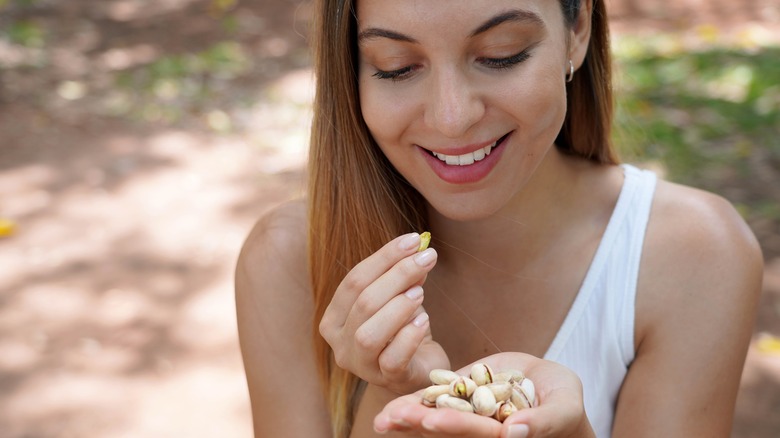When You Eat Pistachios Every Day, This Is What Happens To Your Blood Pressure
If you're a fan of baklava — a sweet dessert with Greek, Turkish, and Middle Eastern roots made with different types of nuts — your blood pressure may thank you. More specifically, it's the pistachio nut your blood pressure has to thank if it's Turkish baklava you fancy, as these seeds are every bit as nutritious as they are delicious. According to the U.S. Department of Agriculture (USDA), you'll find 5.73 grams of protein, 3 grams of fiber, nearly 30 milligrams of calcium, over 34 milligrams of magnesium, 129 milligrams of phosphorus, and a whopping 289 milligrams of potassium all in a single 1-ounce serving of raw pistachio nuts.
Healthy blood pressure means that a person has a systolic blood pressure measurement (the first number) of less than 120 millimeters of mercury (mmHg), reports the U.S. Centers for Disease Control and Prevention (CDC). Systolic blood pressure tells us how much pressure is being exerted on the insides of the arteries as the heart beats. A healthy diastolic blood pressure measurement (the second number) should be less than 80 mmHg, which tells us the amount of pressure being placed on the artery walls while the heart is at rest. Overall, you want to see a healthy blood pressure reading of 120 over 80 or below, and snacking on a handful of pistachio nuts every day may help with that.
Regular consumption of pistachios may help lower systolic blood pressure
Because high blood pressure can put us at risk for heart disease, researchers from a 2020 systematic review published in the British Journal of Nutrition set out to see if munching on pistachios had an effect on participant blood pressure levels, along with various other cardiovascular disease risk factors. Across 13 clinical trials involving over 560 participants, the researchers found that eating pistachios was linked with reductions in systolic blood pressure. This relationship was not seen between pistachio consumption and diastolic blood pressure, however, indicating the need for further study.
Incorporating pistachios into one's daily diet may also benefit those with certain health conditions. This was evidenced in a 2013 study published in Hypertension, where it was found that participants with lipid imbalances (such as high LDL "bad" cholesterol levels and low HDL "good" cholesterol levels) who ate 1 serving of pistachios daily experienced the greatest average drop in systolic blood pressure measurements compared to other diets. Similar results were found in a 2018 study published in Circulation where patients diagnosed with type 2 diabetes spent 8 weeks adhering to two different diets. The moderate fat pistachio diet consisted of eating between 2 and 5 ounces of pistachios each day. The study findings showed that systolic blood pressure dropped significantly in the 24 hours following the pistachio diet. The researchers concluded that eating pistachios on a daily basis may support healthy blood pressure levels in patients with type 2 diabetes.
These are the healthiest types of pistachios to buy
If you're thinking about adding pistachios to your weekly grocery list, know that either raw or salt-free, dry-roasted pistachio nuts will likely offer the greatest amount of health benefits. A 1-ounce serving of raw pistachios contains only 0.284 milligrams of sodium (via USDA), and the same-sized serving of dry roasted pistachios with no salt added contains just 1.7 milligrams of sodium (via USDA). On the other hand, the same serving of salted pistachio nuts without the shell contains 110 milligrams of sodium (via USDA), so you may want to be mindful of what kind of pistachios you purchase.
The same is true if you're trying to get your pistachio intake through pistachio ice cream. While certainly tasty, ice cream can be high in sugar and saturated fat. Not to mention, you may not even be getting any pistachios at all, as many commercial brands alternatively use almond paste and green food dye ingredients, according to American Pistachio Growers. But reduced blood pressure isn't the only perk these nuts may offer; check out how eating pistachios may also help reduce belly fat.



